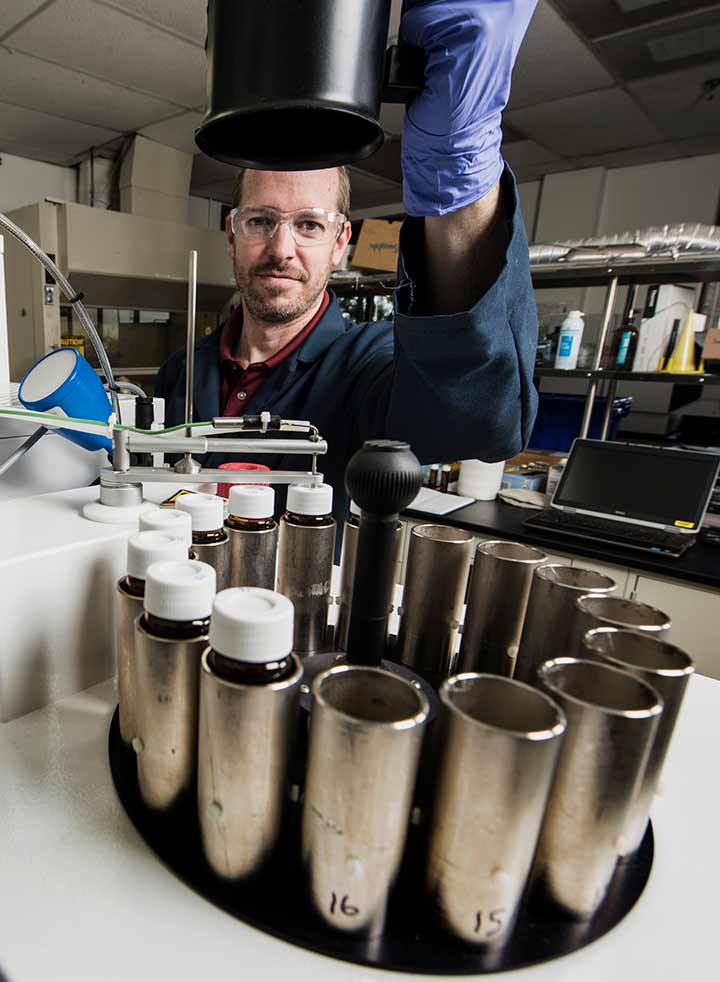Collaboration Initiates New Early-Stage Research
Labs Join Forces to Improve Natural Gas Engines
The U.S. Department of Energy's (DOE) interest in increasing national energy security and lowering the cost of transporting goods spurred a $3 million effort to support cost-shared research to improve high-efficiency natural gas engines. NREL is collaborating with Argonne National Laboratory, Oak Ridge National Laboratory, and Sandia National Laboratories to further this early-stage research.

Researcher Jon Luecke performs fuel analysis using an Advanced Fuel Ignition Delay Analyzer in the Fuels Lab at NREL. Photo by Dennis Schroeder
Currently, natural gas engines can be 10% to 15% less efficient than comparable diesel engines. To combat this, the team at NREL, which includes Jon Luecke and Brad Zigler from the Transportation and Hydrogen Systems Center and Ray Grout, Hariswaran Sitaraman, and Mohammad Rahimi from the Computational Science Center, received $580,000 to research ways of enabling diesel-like efficiency in natural gas engines.
"The current combustion technology for medium- and heavy-duty vehicle natural gas engines enables very low NOx emissions, up to 90% less than diesel. But this combustion strategy will always lag behind diesel in efficiency," Zigler said. "This early-stage research shifts focus to advanced combustion strategies that significantly improve efficiency while maintaining low emissions."
The four-lab team will join forces to research fundamental in-cylinder and emissions-control advancements for higher-efficiency medium- and heavy-duty natural gas engines. The integrated research plan capitalizes on the existing expertise and core capabilities at the DOE labs.
The team will focus on pre-chamber spark-ignition (PCSI) technology, which has already demonstrated efficiency improvements up to 20% in light-duty gasoline engines at low load. PCSI technology was also recently adopted by Formula 1 racers to increase efficiency at high load.
The complex processes that govern PCSI have not yet been explored in detail, and the labs recognized a need for simulation tools to predict these processes. To address this, the team at NREL will be pushing the boundaries of a tool that, within the United States, is unique to the lab. NREL's Advanced Fuel Ignition Delay Analyzer (AFIDA) was developed in Europe to study ignition properties of diesel fuel and will be modified to perform detailed studies of PCSI.
"The NREL team will construct a combustion module simulating PCSI and couple it to the AFIDA to characterize conditions that provide robust ignition for dilute and lean main cylinder fuel charges, the key to high efficiency," Zigler said. "The fundamental ignition simulations and experiments will guide single- and multi-cylinder engine experiments at the partner labs."
While this area of natural gas engine research is new for NREL, the lab has a history of conducting natural gas research and development and promoting safety in the industry. The goal of this research is to provide fundamental support for industry stakeholders, which they requested at the NREL-hosted DOE Natural Gas Vehicle Research Workshop held in July 2017.
Learn more about NREL's sustainable transportation research.
Last Updated May 28, 2025
